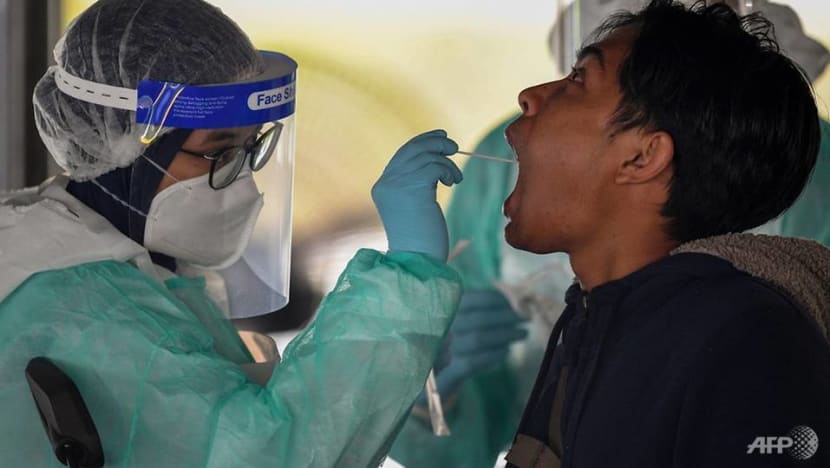Two COVID-19 Omicron subvariants detected in Malaysia

File photo. A health worker in Malaysia uses a swab to collect a sample for COVID-19 testing from a man. (Photo: AFP/Mohd Rasfan)
KUALA LUMPUR: Two subvariants of the highly contagious Omicron strain of the coronavirus have been detected in Malaysia, Health Minister Khairy Jamaluddin said on Thursday (Jun 9).
Two cases with the BA.5 and one case with the BA.2.12.1 subvariant were discovered, he said in a tweet.
Mr Khairy noted that the subvariants are categorised by the WHO (World Health Organization) as lineages under monitoring under the Omicron COVID-19 variant.
"So far, risk factors remain the same,” he said.
Both variants are reported to be more a transmissible version of the original coronavirus.
The BA.2 variant and its BA.2.12.1 subvariant were estimated to make up more than 90 per cent of the COVID-19 variants in the United States, the US Centers for Disease Control and Prevention said in April.
The BA.5 variant was first identified in South Africa, where it is also dominant. It is often discussed together with the BA.4 variant due to genetic similarities.
Malaysia reported 1,887 new COVID-19 cases on Thursday.
BEHAVIOURAL SCIENCE IN VACCINATION CAMPAIGN
In a video posted to the WHO's twitter account, Mr Khairy was asked how Malaysia utilised behavioural science in its COVID-19 vaccination campaign.
He responded that Malaysia had to ensure that the choice architecture that the Health Ministry designed for people to decide if they wanted to be vaccinated was as "frictionless" as possible.
"(The) Health Ministry knew that there was going to be hesitancy (in getting COVID-19 vaccines).
"Make it (vaccinations) easy for them (Malaysians), make it understandable, translate it to as many dialects as possible, get public healthcare workers to go out to communities which are marginalised far in the interior to bring the vaccines to them,” he said.
Behavioural science is the first line of defence for public healthcare, Mr Khairy added.
“If you can get people to behave differently to have health-seeking behaviour, to go for their vaccination then this will tremendously strengthen everything else in the healthcare system,” he said.
BOOKMARK THIS: Our comprehensive coverage of the COVID-19 pandemic and its developments
Download our app or subscribe to our Telegram channel for the latest updates on the coronavirus pandemic: https://cna.asia/telegram














